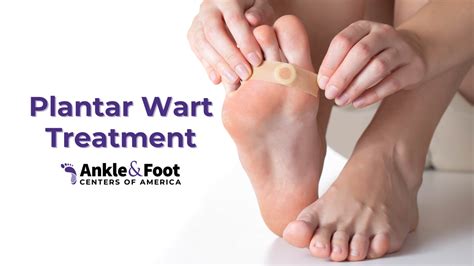Intro
Discover 5 effective ways to treat plantar warts, including home remedies, cryotherapy, and salicylic acid treatments, to relieve painful symptoms and promote healing for stubborn foot warts.
Plantar warts are a common and often frustrating problem for many people. These small, rough growths on the bottom of the foot can be painful and embarrassing, making it difficult to walk or engage in daily activities. Despite their prevalence, many individuals are unsure about how to effectively treat plantar warts. In this article, we will explore the importance of understanding plantar warts and the various treatment options available.
Plantar warts are caused by the human papillomavirus (HPV), which enters the body through small cuts or cracks in the skin. They can be spread through direct contact with an infected person or by walking barefoot in areas where the virus is present. Plantar warts can be particularly problematic because they can be painful and may require prolonged treatment. However, with the right approach, it is possible to eliminate plantar warts and prevent future outbreaks.
Understanding the causes and symptoms of plantar warts is crucial for effective treatment. Plantar warts often appear as small, rough patches on the bottom of the foot, and they can be gray or brown in color. They may also cause pain or discomfort when walking or standing. In some cases, plantar warts can develop into larger growths or spread to other areas of the foot. By recognizing the signs and symptoms of plantar warts, individuals can seek treatment early and prevent more serious problems from developing.
Introduction to Plantar Wart Treatment

Home Remedies for Plantar Warts

Benefits of Home Remedies
Home remedies offer several benefits, including convenience, affordability, and minimal risk of side effects. They can also be used in conjunction with other treatment options, such as over-the-counter medications or prescription creams. Some popular home remedies for plantar warts include: * Applying a paste made from baking soda and water to the affected area * Using a pumice stone to gently remove dead skin cells and help the wart heal faster * Soaking the foot in a solution of apple cider vinegar and water to help kill the virusOver-the-Counter Treatments for Plantar Warts

How to Use Over-the-Counter Treatments
To use over-the-counter treatments effectively, individuals should follow the instructions carefully and be patient. It may take several weeks or even months to see results, and it's essential to continue treatment until the wart is completely gone. Some tips for using over-the-counter treatments include: * Applying the treatment directly to the wart, avoiding surrounding skin * Using a pumice stone or emery board to gently remove dead skin cells and help the treatment penetrate deeper * Keeping the foot clean and dry to prevent the wart from spreadingPrescription Treatments for Plantar Warts

Benefits of Prescription Treatments
Prescription treatments offer several benefits, including faster results and a higher success rate. They can also be customized to meet the individual's specific needs and may be more effective for larger or more stubborn warts. Some popular prescription treatments for plantar warts include: * Cantharidin, a cream that causes the wart to blister and eventually fall off * Imiquimod, a cream that helps to stimulate the immune system and fight off the virus * Podophyllin, a solution that is applied directly to the wart and helps to prevent it from growingSurgical Removal of Plantar Warts

Risks and Complications of Surgical Removal
While surgical removal can be an effective way to treat plantar warts, it's essential to be aware of the potential risks and complications. Some possible risks include: * Infection, which can occur if the area is not properly cleaned and cared for * Scarring, which can be permanent and may affect the appearance of the foot * Nerve damage, which can cause numbness or tingling in the footPrevention of Plantar Warts

Benefits of Prevention
Preventing plantar warts offers several benefits, including reducing the risk of infection and minimizing the need for treatment. By taking simple steps to protect the feet, individuals can help to keep their feet healthy and avoid the discomfort and embarrassment of plantar warts.What causes plantar warts?
+Plantar warts are caused by the human papillomavirus (HPV), which enters the body through small cuts or cracks in the skin.
How can I treat plantar warts at home?
+Some common home remedies for plantar warts include applying duct tape to the affected area, using tea tree oil or garlic to help kill the virus, and soaking the foot in warm water to soften the wart.
What are the benefits of prescription treatments for plantar warts?
+Prescription treatments offer several benefits, including faster results and a higher success rate. They can also be customized to meet the individual's specific needs and may be more effective for larger or more stubborn warts.
How can I prevent plantar warts?
+Some ways to prevent plantar warts include practicing good hygiene, avoiding direct contact with an infected person or contaminated surfaces, wearing shoes or sandals in public areas, and keeping the feet clean and dry.
What are the risks and complications of surgical removal of plantar warts?
+While surgical removal can be an effective way to treat plantar warts, it's essential to be aware of the potential risks and complications, such as infection, scarring, and nerve damage.
We hope this article has provided you with a comprehensive understanding of plantar warts and the various treatment options available. Whether you prefer home remedies, over-the-counter treatments, or prescription medications, there are many effective ways to eliminate plantar warts and prevent future outbreaks. If you have any further questions or concerns, please don't hesitate to reach out to a healthcare professional for guidance and support. Share this article with your friends and family to help spread awareness about plantar warts and the importance of foot health. Together, we can work towards a future where plantar warts are a thing of the past.
